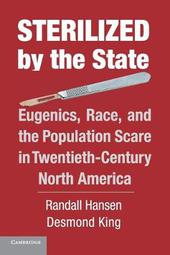
|
Sterilized by the State: Eugenics, Race, and the Population Scare in Twentieth-Century North America
Paperback / softback
Main Details
| Title |
Sterilized by the State: Eugenics, Race, and the Population Scare in Twentieth-Century North America
|
| Authors and Contributors |
By (author) Randall Hansen
|
|
By (author) Desmond King
|
| Physical Properties |
| Format:Paperback / softback | | Pages:309 | | Dimensions(mm): Height 229,Width 153 |
|
| ISBN/Barcode |
9781107659704
|
| Classifications | Dewey:363.90970904 363.920973 |
|---|
| Audience | | Professional & Vocational | | Tertiary Education (US: College) | |
|---|
| Illustrations |
Worked examples or Exercises
|
|
Publishing Details |
| Publisher |
Cambridge University Press
|
| Imprint |
Cambridge University Press
|
| Publication Date |
26 August 2013 |
| Publication Country |
United Kingdom
|
Description
This book is the first comprehensive analysis of eugenics in North America focused on the second half of the twentieth century. Based on new research, Randall Hansen and Desmond King show why eugenic sterilization policies persisted after the 1940s in the United States and Canada. Through extensive archival research, King and Hansen show how both superintendents at homes for the 'feebleminded' and pro-sterilization advocates repositioned themselves after 1945 to avoid the taint of Nazi eugenics. Drawing on interviews with victims of sterilization and primary documents, this book traces the post-1940s development of eugenic policy and shows that both eugenic arguments and committed eugenicists informed population, welfare, and birth control policy in postwar America. In providing revisionist histories of the choice movement, the anti-population growth movement, and the Great Society programs, this book contributes to public policy and political and intellectual history.
Author Biography
Randall Hansen is Director of the Centre for European Russian and Eurasian Studies and Canada Research Chair in Political Science at the University of Toronto. Hansen has served as Fellow and Tutor in Politics at Merton College, Oxford, and has held a Research Fellowship at Christ Church, Oxford. He is author of Citizenship and Immigration in Postwar Britain, Fire and Fury: The Allied Bombing of Germany 1942-44 (shortlisted for the Governor General's Literary Award) and Disobeying Hitler: German Resistance after July 20, 1944. Desmond King holds the Andrew W. Mellon Chair at the University of Oxford and is a Fellow of Nuffield College, Oxford. His research on race, welfare, and liberalism includes In the Name of Liberalism: Illiberal Social Policy in the United States and Britain; Making Americans: Immigration, Race, and the Origins of the Diverse Democracy; The Liberty of Strangers: Making the American Nation; and Still a House Divided: Race and Politics in Obama's America (with Rogers M. Smith), selected as a Choice Outstanding Academic Title. He is a Fellow of the British Academy.
Reviews"Sterilized by the State is the best general history of sterilization policy to date, combining a wide reading of the international literature on the topic with extensive archival research. The interviews with victims of sterilization add a human-interest dimension to the book, which helps link the authors' emphasis on ideas with the actual implementation of sterilization policies on the ground. As harrowing as the victims' stories are, the authors don't descend to cheap moralizing, but rather place the events and people associated with the history of sterilization in their appropriate contexts. This is a landmark publication." - Ian Dowbiggin, University of Prince Edward Island "Sterilized by the State highlights the persistence of forced sterilization practices after World War II, a salient topic given that most research on eugenics has assumed that sterilization practices fizzled out in the post-World War II era. There is little previously published material that engages in depth with sterilization practices in the postwar decades in the United States, and none to my knowledge that does so from a political science angle. Hansen and King break the trend not only by asking why sterilization policies were developed, but also by exploring those contexts where they were not. I expect this volume to change our current understanding of these analytical questions of policy analysis and, more empirically, of sterilization practices in the postwar period. I have no doubt that this will become a groundbreaking volume." - Veronique Mottier, Jesus College, University of Cambridge
|